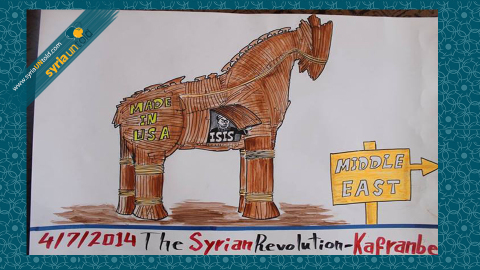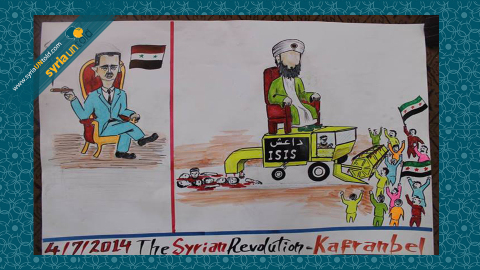The latest declaration by Abu Bakr al-Baghdadi, the head of the Islamic State in Iraq and Syria (ISIS), establishing a new “Islamic Caliphate” under his rule, sent shockwaves in Syrian society and initiated a heated debate between its major intellectuals on its meaning.
The first reaction to the declaration came through a statement signed by more than 260 Syrian and Arab intellectuals that opened with an unreserved condemnation of ISIS: “This proposed theocracy is in its essence a system of enslavement founded on a racist and fascist regime.” The statement was met with mixed reactions. Much of it was criticized for focusing on Iran, while seemingly ignoring all the support ISIS receives from the Arab Gulf countries. The signatories countered that the statement is a condemnation of ISIS and is not intended as a definitive analysis of the Syrian crisis.
The fact that ISIS may serve as a useful tool for regional governments is only part of the truth according to Syrian poet Alaa Eddin Abd al-Mawla: “ISIS was born out of a religious tradition of fundamentalism and Takfirism, that believes in its mission to return our world into that of the days of the prophet. ISIS would not have been implanted had there not been a fertile ground for its cancerous growth. Even if we take the hypothesis that ISIS is a fabrication of regional players at face value, we must admit that this fabricated entity had found ample material in the Islamic tradition to build itself.”
Abd al-Mawla believes that the Islamic cultural tradition is directly culpable for its structural deficiencies that allow for an entity like ISIS to develop, by never accepting the democratic and civic values of modernity.
Intellectuals also pointed the finger at the role played by political Islamist currents in the past few decades and their refusal to bring about a compromise between Islam as a tradition and modern political reality. Yassin al-Hajj Saleh believes that ISIS is a direct product of the opportunistic attitudes of Islamist political parties in modern history and their cynical manipulation of the religion to serve political goals.
Khudr al-Agha also points the blame squarely at Islamists: “The latest declaration is not the making of ISIS alone. It is the fulfillment of all of those who spent their lives preaching Islam as a solution to all modern problems. Here it is, the dream of Islamists (from the moderate Ikhwan, to the Wahabi extremists) is upon us.”
Despite the catastrophic and far-reaching implications of ISIS’s latest escalation, there has been a growing a consensus that it also represents the beginning of the end of the Islamist project in the region. Writer Bakr Sudqi believes that after Islamist wins in Gaza, Egypt and Turkey (arguably, their most successful experiment in governance), things are going downhill for them now. According to Sudqi “these experiments were necessary to rid ourselves from that delusion that Islamic is a magical solution. It is the same in Iran, and the two forms of theocracy are bound to disappear together.”
On the other hand, Jad al-Karim al-Jibaai, pointed the finger at leftist and secular currents for not standing up to the Islamists. Rim Turkmani also criticized the different sectors of the opposition in this collapse for their role in destroying the state as a way to fight the regime.
These discussions come at a crucial moment in Syria’s revolution and, arguably, in the history of the whole region. The reignite historical differences and may even point out at further fragmentation, but they also serve as important reference points and leads for the future.





